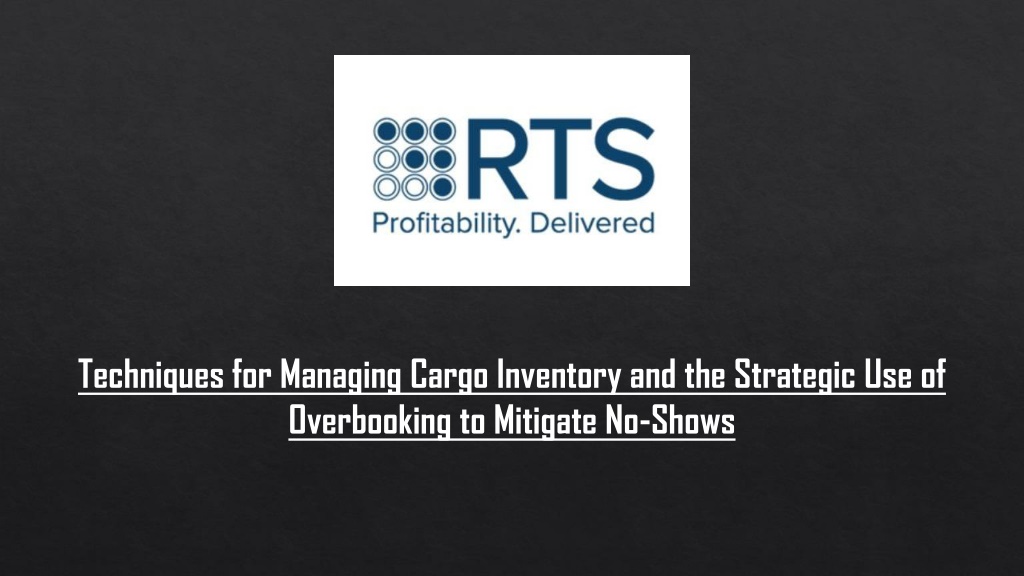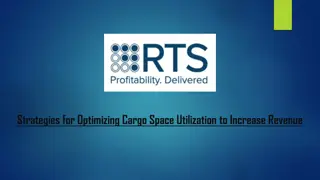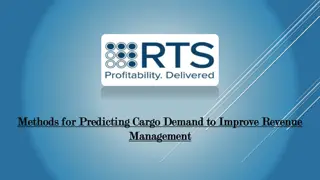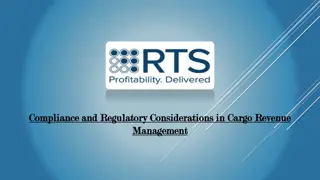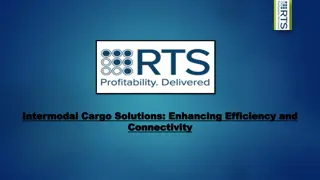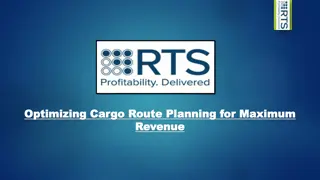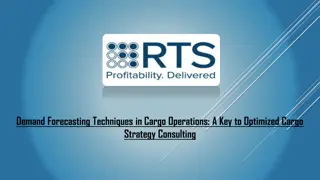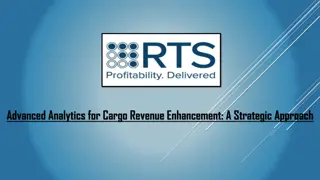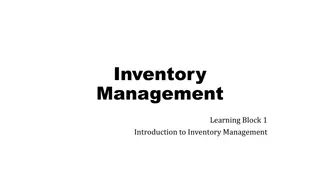Techniques for Managing Cargo Inventory
In the dynamic and competitive world of cargo logistics, efficient cargo inventory management and strategic pricing are essential for maximizing revenue and ensuring seamless operations. Leveraging advanced cargo revenue management techniques, such as overbooking, can significantly enhance profitability and service reliability. Here's an in-depth look at these critical strategies.n
Download Presentation

Please find below an Image/Link to download the presentation.
The content on the website is provided AS IS for your information and personal use only. It may not be sold, licensed, or shared on other websites without obtaining consent from the author.If you encounter any issues during the download, it is possible that the publisher has removed the file from their server.
You are allowed to download the files provided on this website for personal or commercial use, subject to the condition that they are used lawfully. All files are the property of their respective owners.
The content on the website is provided AS IS for your information and personal use only. It may not be sold, licensed, or shared on other websites without obtaining consent from the author.
E N D
Presentation Transcript
Techniques for Managing Cargo Inventory and the Strategic Use of Overbooking to Mitigate No-Shows
In the dynamic and competitive world of cargo logistics, efficient cargo inventory management and strategic pricing are essential for maximizing revenue and ensuring seamless operations. Leveraging advanced cargo revenue management techniques, such as overbooking, can significantly enhance profitability and service reliability. Here's an in-depth look at these critical strategies.
Cargo Inventory Management Techniques Effective cargo inventory management hinges on accurate forecasting, real-time data analysis, and robust inventory control systems. Here are some key techniques used by industry leaders: 1.Demand Forecasting: Utilizing historical data and market trends, companies can predict cargo demand accurately. Advanced algorithms and machine learning models analyze patterns, seasonal fluctuations, and economic indicators to provide precise forecasts, enabling better inventory planning and capacity allocation. 2.Dynamic Pricing: Dynamic pricing adjusts rates based on real-time demand and supply conditions. By continuously analyzing market conditions, companies can optimize pricing to maximize revenue. This involves implementing flexible pricing strategies that can respond to changes in demand, ensuring that cargo space is sold at the best possible rate. 3.Real-Time Inventory Tracking: Real-time tracking systems provide up-to-the-minute information on cargo location and status. This allows for efficient management of resources, quick identification of bottlenecks, and proactive resolution of potential issues. Technologies like RFID, GPS, and IoT play a crucial role in enhancing visibility and control over cargo movements. 4.Load Optimization: Maximizing the use of available space is vital for cost efficiency. Load optimization techniques ensure that cargo is packed and transported in the most efficient manner, reducing wasted space and improving load factors. Advanced software solutions can help in planning and executing optimal loading strategies.
Strategic Overbooking to Mitigate No-Shows Overbooking is a well-known strategy in the airline and hospitality industries, and it can be effectively applied to cargo logistics as well. Given the unpredictability of no-shows, where booked cargo fails to turn up for shipment, overbooking helps in mitigating potential revenue losses. 1.Historical Analysis: Analyzing past data on no-shows and cancellations allows companies to determine optimal overbooking levels. By understanding historical trends, businesses can estimate the probability of no-shows and adjust booking policies accordingly. 2.Risk Management: Strategic overbooking involves balancing the risk of over-commitment with the likelihood of no-shows. Companies must develop robust risk management frameworks to ensure that overbooking does not lead to overselling and subsequent customer dissatisfaction. This includes setting conservative overbooking limits and having contingency plans in place. 3.Real-Time Adjustments: Implementing real-time adjustments based on the latest booking and cancellation data is crucial. Advanced analytics and automated systems can help in dynamically adjusting overbooking levels, ensuring optimal cargo space utilization without compromising service quality. 4.Customer Communication: Transparent communication with customers regarding booking policies and potential overbooking scenarios is essential. Building trust through clear terms and conditions, and offering compensation or alternative solutions in case of overbooking, helps in maintaining customer satisfaction and loyalty.
Conclusion Incorporating advanced cargo revenue management and strategic pricing techniques is vital for staying competitive in the logistics industry. Effective cargo inventory management, coupled with the strategic use of overbooking, can significantly enhance operational efficiency and profitability. By leveraging historical data, real-time analytics, and dynamic pricing models, companies can optimize cargo space utilization, mitigate the impact of no-shows, and ensure a reliable service for their customers. Embracing these strategies not only drives revenue growth but also strengthens customer relationships and market positioning.
THANK YOU THANK YOU
